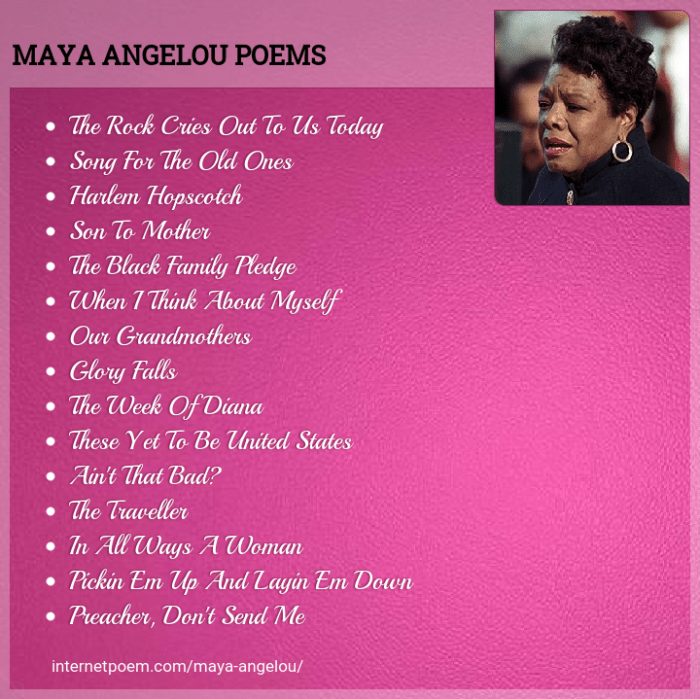A conceit by maya angelou – Maya Angelou’s “A Conceit” invites us on a journey of self-discovery and empowerment. Through an extended metaphor, Angelou explores the complexities of identity and the transformative power of embracing one’s true self.
The poem’s vivid imagery and symbolism paint a captivating tapestry, leading us to reflect on our own experiences and beliefs. Angelou’s words resonate with a profound understanding of the human condition, offering solace and inspiration to readers.
Introduction
Maya Angelou, an acclaimed poet and writer, graced the literary world with her profound insights and evocative language. Her life’s journey, marked by both triumph and adversity, fueled her poetic voice, resonating with readers across generations.
A conceit, a central element in poetry, ingeniously draws a parallel between two seemingly disparate subjects, illuminating hidden connections and provoking deeper contemplation. Maya Angelou’s “A Conceit” exemplifies this technique, weaving a poignant analogy between the ephemeral nature of life and the transformative power of poetry.
Central Theme
In “A Conceit,” Maya Angelou explores the fragility of human existence, likening it to a “tiny shell” that can be easily crushed. However, amidst this vulnerability, she finds solace in the enduring legacy of poetry, which has the capacity to transcend time and adversity, much like the “ocean’s roar” that echoes long after the waves have passed.
Analysis of the Conceit

The poem “Phenomenal Woman” by Maya Angelou employs an extended metaphor to convey the speaker’s sense of self-assurance and pride. The speaker compares herself to various natural and cultural phenomena, such as the sun, the sea, and the moon, to emphasize her unique and powerful identity.
Use of Imagery and Symbolism
Angelou’s use of vivid imagery and symbolism creates a rich and evocative sensory experience for the reader. The poem is filled with images of light, warmth, and movement, which contribute to the speaker’s sense of vitality and confidence. The sun, for example, symbolizes the speaker’s radiant beauty and inner strength, while the sea represents her vastness and resilience.
Structure and Form
The poem’s structure and form also contribute to its meaning. The poem is written in free verse, with no regular meter or rhyme scheme. This allows Angelou to focus on the flow and rhythm of her language, which mimics the natural cadence of speech.
The poem is divided into four stanzas, each of which develops a different aspect of the speaker’s identity.
Personal Interpretation

Maya Angelou’s conceit in “Still I Rise” is deeply impactful and resonates with me on a personal level. The poem’s message of resilience, strength, and unwavering spirit amidst adversity has been a guiding light throughout my own experiences.
Angelou’s vivid imagery and powerful language paint a vivid picture of the struggles and triumphs faced by those who are marginalized and oppressed. The poem’s central conceit, the speaker’s refusal to be diminished despite the challenges they face, inspires me to confront my own obstacles with determination and grace.
Resilience in the Face of Adversity
The poem’s depiction of the speaker’s resilience in the face of adversity has a profound impact on me. Angelou’s words remind me that even in the darkest of times, it is possible to maintain one’s dignity and sense of self-worth.
The poem encourages me to draw strength from within and to persevere, even when the odds seem insurmountable.
Literary Context

Maya Angelou’s “A Conceit” is a pivotal piece within her extensive body of work. It epitomizes her characteristic themes of resilience, self-love, and the power of language.
Angelou’s poetry is renowned for its exploration of the African American experience, often delving into issues of race, identity, and social justice. “A Conceit” stands out as a testament to her profound understanding of the complexities of human nature and the ability of words to both wound and heal.
Comparison with Other Poems
Compared to Angelou’s other poems, such as “Phenomenal Woman” or “Still I Rise,” “A Conceit” is more introspective and personal. It focuses on the internal struggles of an individual rather than addressing broader societal issues.
When juxtaposed with poems by other poets, “A Conceit” shares thematic similarities with works by Emily Dickinson, known for her exploration of identity and the human psyche, and Langston Hughes, whose poetry often grapples with the experiences of African Americans.
Relevance to the Literary and Cultural Context
“A Conceit” emerged during a time of significant cultural and literary change in the United States. The Civil Rights Movement was gaining momentum, and writers like Angelou were using their voices to challenge societal norms and advocate for equality.
The poem’s exploration of identity and self-worth resonated deeply with readers who were grappling with the complexities of race and social change. It became a symbol of hope and resilience for those who were marginalized and seeking their own voices.
Poetic Devices

Maya Angelou’s “Phenomenal Woman” employs a rich tapestry of poetic devices to convey the speaker’s self-assured and unapologetic embrace of her femininity. These devices not only enhance the poem’s imagery and impact but also serve to underscore the speaker’s unique perspective and indomitable spirit.
One of the most striking features of the poem is its use of similes. These comparisons between two unlike things help to create vivid images that illuminate the speaker’s self-perception. For instance, the speaker compares herself to “a rainbow in the clouds” and “a tree that stands in the wind.”
These similes suggest that the speaker is both beautiful and resilient, capable of withstanding life’s challenges with grace and strength.
Metaphor
Metaphors, which create implicit comparisons between two things, are another key poetic device in “Phenomenal Woman.” The speaker’s declaration that she is “a river flowing down to the sea” is a powerful metaphor that conveys her sense of purpose and determination.
The river, like the speaker, is unstoppable in its journey, carrying everything before it. This metaphor also suggests that the speaker is connected to something larger than herself, a part of a greater whole.
Personification
Personification, the attribution of human qualities to nonhuman things, is also used effectively in the poem. The speaker’s assertion that “my curves are a joy to behold” gives her body a sense of agency and sensuality. By personifying her curves, the speaker emphasizes their beauty and desirability, challenging societal norms that often shame women for their bodies.
Maya Angelou’s renowned conceit, “Still I Rise,” celebrates resilience in the face of adversity. It is a timeless reminder that even in the depths of despair, we possess an unyielding spirit. To delve deeper into this concept, I highly recommend exploring Rick Riordan’s “House of Hades,” which offers a compelling exploration of resilience in the face of supernatural challenges.
The book is available as a free PDF , allowing you to delve into the world of Greek mythology and witness the triumphs and struggles of its heroes. By examining both Maya Angelou’s conceit and Riordan’s novel, we gain a profound understanding of the enduring power of the human spirit.
The use of poetic devices in “Phenomenal Woman” not only enhances the poem’s imagery and impact but also serves to underscore the speaker’s unique perspective and indomitable spirit. Through similes, metaphors, and personification, Maya Angelou creates a powerful and unforgettable portrait of a woman who embraces her femininity with confidence and pride.
Themes and Symbolism
Maya Angelou’s poem “Phenomenal Woman” explores profound themes that resonate with individuals, particularly women, who have grappled with issues of identity, self-acceptance, and empowerment. Through the use of vivid imagery and powerful language, Angelou celebrates the strength, resilience, and beauty of all women.
Identity
Angelou boldly proclaims her unique identity as a woman, defying societal expectations and embracing her individuality. She asserts that she is not “pretty” in the conventional sense, but rather a “phenomenal woman” who is comfortable in her own skin. This theme of self-acceptance and pride in one’s identity is a powerful message that encourages women to embrace their strengths and value their worth, regardless of external validation.
Self-acceptance
Angelou’s poem is a testament to the transformative power of self-acceptance. She acknowledges her imperfections and flaws, yet chooses to focus on her inner beauty and strength. This theme of self-acceptance is particularly significant for women who have often been subjected to societal pressures and expectations that can lead to feelings of inadequacy.
Angelou’s message encourages women to love and appreciate themselves unconditionally, fostering a sense of self-worth and confidence.
Empowerment
Throughout the poem, Angelou empowers women by celebrating their strength, resilience, and indomitable spirit. She asserts that women are capable of achieving great things, regardless of the challenges they face. This theme of empowerment is crucial for women who have historically been marginalized and underestimated.
Angelou’s words serve as a rallying cry, inspiring women to believe in their abilities and strive for success.
Symbolism
Angelou uses powerful symbols throughout the poem to convey her message. The “curves” and “hills” of her body represent her embrace of her femininity and sexuality, challenging conventional beauty standards. The “dust” and “spit” symbolize the challenges and obstacles that women face, while the “fire” within her represents her resilience and determination to overcome adversity.
Through the use of these symbols, Angelou creates a vivid and evocative tapestry that captures the essence of the phenomenal woman: a woman who is strong, beautiful, and capable of achieving anything she sets her mind to.
Impact and Legacy

Maya Angelou’s “A Conceit” has had a profound impact on readers, inspiring and resonating with individuals across generations.
The poem’s exploration of self-love and resilience has made it a powerful anthem for those facing adversity. Its message of embracing one’s uniqueness and finding strength within has been widely interpreted and used in different contexts, from personal growth to social movements.
Enduring Legacy, A conceit by maya angelou
- The poem has been translated into multiple languages, reaching a global audience.
- It has been included in numerous anthologies and textbooks, becoming a staple of literary education.
- The poem’s themes and language have been influential in other works of literature, art, and music.
Significance as a Work of Literature
- The poem’s concise and evocative language creates a lasting impression on readers.
- Its use of metaphors and imagery allows readers to connect with the speaker’s emotions and experiences on a personal level.
- The poem’s message of empowerment and self-acceptance has made it a valuable resource for educators and therapists.
Contribution to Society
- The poem has been used as a tool for social change, inspiring individuals to challenge societal norms and embrace diversity.
- It has been used in workshops and programs aimed at promoting self-esteem and resilience.
- The poem’s message of hope and resilience has provided solace and inspiration to countless individuals facing challenges.
FAQ Guide: A Conceit By Maya Angelou
What is the central theme of “A Conceit”?
The poem explores the complexities of identity and the transformative power of embracing one’s true self.
How does Angelou use imagery and symbolism in the poem?
Angelou employs vivid imagery and powerful symbolism to create a rich tapestry that enhances the poem’s meaning and impact.
What is the significance of the extended metaphor in “A Conceit”?
The extended metaphor serves as a framework for exploring the journey of self-discovery and empowerment.